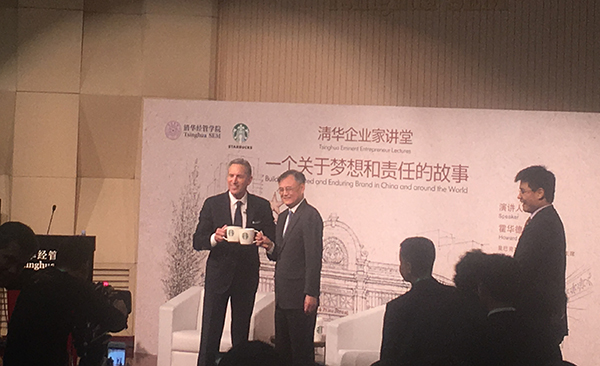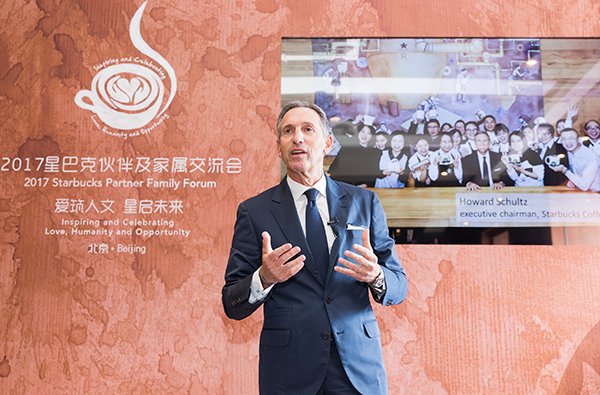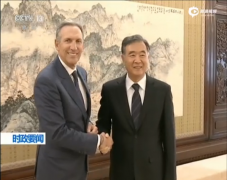Former Starbucks CEO: Feel Ali threat stores must have emotional appeal
Starbucks (SBUX) is adjusting its strategy to cope with the e-commerce boom and new consumers.
In a speech at Tsinghua University on April 11, a week after stepping down as chief executive, Howard Howard Schultz said every brick-and-mortar store was threatened by online ecommerce because of Amazon, Alibaba and so on. "this means a big change in retailing. Many brick-and-mortar stores will be closed, and we have to build better, emotionally appealing, romantic stores." Howard said.

On the evening of April 11, after a speech at the School of Economics and Management of Tsinghua University, Howard Schultz celebrated with Qian Ying, dean of the School of Economics and Management of Tsinghua University. Photo by thepaper.cn reporter Zhang Mowxiang
In recent years, Starbucks has also been under the impact of e-commerce. In July 2013, perhaps because of high rents, Starbucks closed its store on the ground floor of Beijing's International Trade Mall, its first store in mainland China.
Deal with the challenges of physical stores in the future
For now, Howard's focus has shifted to the innovation, design and development of selected coffee stores around the world, promoting the expansion of the retail store model, and commitment to Starbucks' corporate social responsibility.
It is understood that the first Starbucks coffee roaster and Zhenxuan (referred to as "coffee roaster") in the market outside the United States has been established in Shanghai and will open at the end of 2017. In December 2014, Starbucks launched the industry's first "Zhenxuan Coffee Roaster" in Seattle, USA. In Howard's view, this is the next generation of retail experience, which will help Starbucks cope with the challenges of future brick-and-mortar stores. "when you enter [the coffee roaster], you will be dizzy with happiness."
Howard revealed that Starbucks is trying to make more connections with post-00s. "through technical means, we must connect the post-00s generation who live in the digital age. We should not be satisfied with the status quo, we should constantly innovate, and we should innovate at all points connected with customers. Outside Starbucks stores, we are still building a digital experience. " Howard said.
In December 2015, Starbucks Tmall's official flagship store officially opened.
Tencent and WeChat Pay announced a formal strategic cooperation in Guangzhou on December 8, 2016, and Starbucks will access nearly 2500 Starbucks Chinese mainland stores from now on. In addition, Starbucks launched social digital consumption experiences such as social gift experiences on Wechat in early 2017.
In addition to online and offline integration, mobile payments, social consumer experience, personalized store experience, Howard also revealed that Starbucks also makes emotional connections with customers by doing content.
Faced with various challenges, Howard believes that Starbucks now needs to be able to show its humility and make people trust.
Howard stressed that Starbucks is a brand that is closely related to the local community and adapts to local conditions. "Starbucks is very Chinese in China, and people who enter Starbucks stores in China will not think that this is a store opened by the United States." Howard said with a smile.
"I can't watch Starbucks collapse."
"No matter how successful you are, if you are only satisfied with the status quo, you will fall into the trap of death." Howard warned.
In 2007, Starbucks began to go downhill, Howard revealed in his autobiography all the way forward. "because of the excessive pursuit of growth, we ignore the operation of the company and no longer attach so much importance to the core values of the company." Howard confessed.
In January 2008, Howard returned to his eight-year post as chief executive of Starbucks to revive Starbucks by closing stores, training baristas and announcing "starting from scratch" to the world. "Starbucks is my life, it's a part of me, and I can't watch it collapse." Howard revealed in his book. At a speech at Tsinghua University, Howard also reviewed Starbucks' first few years of entry into China. In 1999, Starbucks entered China. At that time, there was a voice that Starbucks could never succeed in China because the Chinese had a tradition of drinking tea. "in the first few years, we actually lost money." Howard confessed.
At present, China has become Starbucks' largest international market. At Chinese mainland, Starbucks has more than 2600 stores in more than 120 cities and employs nearly 40, 000 people.
In a speech entitled "A Story of Dreams and responsibilities" at Tsinghua University, Howard expressed the view several times that not all business decisions are based on economic purposes.
Starbucks will invest more in China
On the morning of April 11, Howard appeared at the "2017 Starbucks partner and Family Exchange meeting" held at Starbucks' 798 screening store in Beijing. Howard said at the meeting that he has strong confidence in China's future development prospects, and Starbucks will make more investment in China.
According to Xinhua News Agency, Vice Premier Wang Yang met with Howard in Ziguangge, Zhongnanhai, Beijing on April 11. Schultz.

On the morning of April 11, Howard appeared at the "2017 Starbucks partner and Family Exchange meeting" held at Starbucks Beijing 798 screening store.
At the exchange meeting, Howard also released Starbucks' Parental Care Program, that is, for full-time employees for more than two years, whose parents are under the age of 75, and who are eligible for insurance, starting from June 1 this year, Starbucks will provide its employees' parents with full-owned serious illness insurance.
Howard said Starbucks' goal is to strike a balance between business profits and social ethics. "from beginning to end, we deeply believe that no matter which country or market in the world, including China, the best success is to share with others." Howard said.
Howard was born poor and his father was an ordinary blue-collar worker. When Howard was seven years old, Howard's father, a truck driver, slipped while transporting diapers. Without any insurance, Howard watched his father lose his ability to work and was fired.
In a conversation with Starbucks employees in China on the morning of April 11, Howard admitted that I realized when he was very young, "I can't get what other children can easily get, and my parents work hard every day to barely support their family." I can feel the pressure, inferiority and shame. " Howard added, "after all these years, I still have a subconscious scar from a poor boy in my heart. It's always there." Howard says Starbucks wants to provide jobs for as many people as possible.
Speaking at Tsinghua University, Howard, 65, revealed that he loves Starbucks. "I'm not going anywhere. I'll focus on the long-term value of the company."
Important Notice :
前街咖啡 FrontStreet Coffee has moved to new addredd:
FrontStreet Coffee Address: 315,Donghua East Road,GuangZhou
Tel:020 38364473
- Prev

Wang Yang meets with Executive Chairman of the Board of Directors of Starbucks Coffee Company
Vice Premier Wang Yang met with Howard Schultz, executive chairman of the board of directors of Starbucks Coffee Company, in Ziguangge, Zhongnanhai on the afternoon of the 11th.
- Next

Honghualing Village, Longmen Town, Ding'an takes the lead in setting up economic cooperatives to help villagers shake off poverty and become rich.
Honghualing Village, Longmen Town took the lead in setting up an economic cooperative to help villagers shake off poverty and become rich. Recently, the reporter walked into Honghualing Village, Longmen Town, Dingan County. In the east of the village, there are lush coffee and betel nut seedlings on a flat piece of land, greedily absorbing nutrients from nature in the sun, and the tender green leaves swing around with the spring breeze, bringing unlimited vitality. This is where the villagers are rich in agriculture.
Related
- Can lightly roasted coffee beans be used to extract espresso? How finely should you grind high-quality coffee beans to make Italian latte?
- What is the difference between the world's top rose summer coffee and Yejia Shefi? What are the flavor characteristics of Yega Shefi coffee and Panama rose summer?
- The ceremony is full! Starbucks starts to cut the ribbon at a complimentary coffee station?!
- A whole Michelin meal?! Lucky launches the new "Small Butter Apple Crispy Latte"
- Three tips for adjusting espresso on rainy days! Quickly find the right water temperature, powder, and grinding ratio for espresso!
- How much hot water does it take to brew hanging ear coffee? How does it taste best? Can hot water from the water dispenser be used to make ear drip coffee?
- What grade does Jamaica Blue Mountain No. 1 coffee belong to and how to drink it better? What is the highest grade of Blue Mountain coffee for coffee aristocrats?
- What are the flavor characteristics of the world-famous coffee Blue Mountain No. 1 Golden Mantelin? What are the characteristics of deep-roasted bitter coffee?
- Can I make coffee a second time in an Italian hand-brewed mocha pot? Why can't coffee be brewed several times like tea leaves?
- Hand-brewed coffee flows with a knife and a tornado. How to brew it? What is the proportion of grinding water and water temperature divided into?

